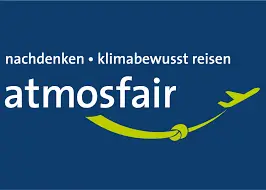CO2 compensation through atmosfair
The climate protection organization “atmosfair” (see www.atmosfair.de ) collects compensation contributions from individual air travelers or tour operators and uses them to set up CO2-saving projects in developing countries, e.g. for the supply of electricity and heat from renewable energy sources, the use of energy-saving cooking stoves in village households (instead of the conventional open wood fires with high material and energy consumption) or the efficient use of biomass.
The main criterion for establishing and evaluating such an “atmosfair” project is the calculation by independent auditors of the emission reduction that can be achieved compared to the amount of emissions that would occur without the use of the supported climate-friendly technology. The calculated savings are then compared to the amount of flight-related emissions offset through “atmosfair” contributions, and the money collected from the offset payments is used to finance the atmosfair project. In short, this means: atmosfair-compensated flight emissions are offset by atmosfair-financed projects to reduce greenhouse gases in developing and emerging countries.
FURTHERMORE, SUCH PROJECTS CONTRIBUTE TO CLIMATE PROTECTION IN ANOTHER, MORE COMPREHENSIVE WAY: They make modern technologies for environmentally friendly energy generation and emission reduction tangible and accessible in the target countries. Through such technology transfer from an industrialized country to a developing country, they also promote sustainable, climate-friendly development in the “Third World” in the long term.
Tourism, in particular, can demonstrate and promote how environmental and resource conservation is possible even within “modern” lifestyles . One impressive example is the commitment of the tour operator umbrella organization “forum anders reisen” (of which Ghana-Reisen is a member) to the rebuilding of a tourist trekking trail in Nepal.
Tourists were able to hike through the mountain region for seven days – until the severe earthquake there in 2015 caused dramatic destruction. In collaboration with development aid organizations, local travel providers, and Nepalese authorities, an overall concept for the reconstruction of the privately run lodges and the local infrastructure was developed. “atmosfair” provided significant support for the establishment of CO2- and low-consumption measures – from small-scale biogas plants and efficient stoves to photovoltaics and water treatment – and was able to continuously draw on the entire flight compensation contributions that “forum anders reisen” received in accordance with a member resolution.
In this way, local income-generating opportunities from tourism were restored and improved on the trekking trails. At the same time, the extensive collaboration of the participating organizations and institutions implemented an exemplary concept for the cost-effective and resource-saving supply of electricity, light, hot water, and cooking facilities. This now demonstrates how living conditions can be improved step by step throughout the entire mountain region and can also be transferred to other parts of the country. And with the help of “atmosfair” payments, long-distance tourism has also contributed to this.
And the conclusion? The number of kilometers flown or not flown cannot and must not be the sole parameter for climate- friendly tourism practices. Equally important in a broader sense is the quality and model function of what tourism demonstrates and exemplifies in the destination region.
Therefore: Fly without flight shame – but with atmosfair, especially when traveling to distant countries

